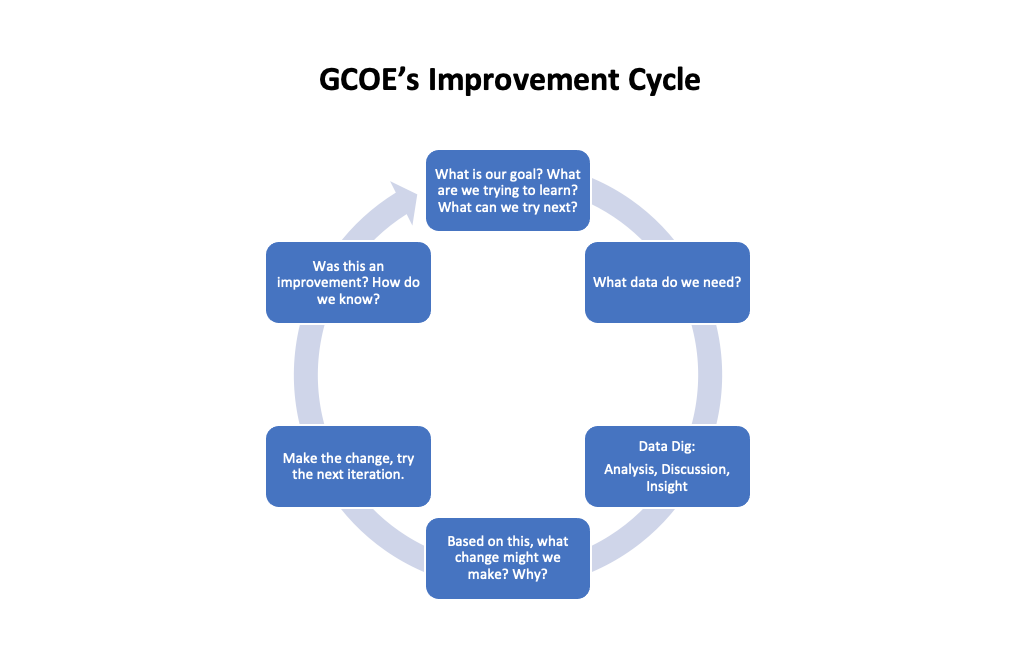The Graduate College of Education (GCOE) process for continuous improvement is described as an inquiry cycle that begins with articulating a question, then moves to gathering data, analyzing and interrogating the data, making, changing and evaluating that change with more data, then starting over with more questions. This “Plan-Do-Study-Act” cycle moves us quickly (or slowly) through iterations until we reach the goal.

GCOE’s Improvement Cycle
The image above describes the improvement cycle process for the Graduate College of Education. The process, which is described below is clockwise and each step has questions on the cycle followed by an arrow (-->) indicating the process action or the parties involved. All questions are based on the Plan-Do-Study-Act (PDSA) method.
- What is our goal? What are we trying to learn? What can we try next? --> College, dept and program goals, standards, Program Learning Outcomes (PLO) and Student Learning Objective (SLO).
- What data do we need? --> Collect, organize data and update the Data Kitchen.
- Data Dig: Analysis, discussion and insight --> In college meetings (Fall), dept and program meetings (Spring) and ongoing.
- Based on this, what change might we make? Why? --> Identify a specific plan, something new to try, something to build on.
- Make the change, try the next iteration --> Use updated data to measure the outcome.
- Was this an improvement? How do we know? --> How did that work? Did the outcome go as expected? What can we learn next about this?
Continuous Improvement Framework
- Are we promoting an inquiry orientation to the use of data?
- Are we providing access to high-quality data to appropriate stakeholders to measure our impact?
- Do we have established routines and norms for collaborative data conversations?
- Are improvement efforts grounded in short cycles of data collection and improvement?
- Are we making improvements and changes based on data and the continuous improvement framework, not just intuition and anecdote?
GCOE’s Unit-wide Routine for Collecting, Discussing, Analyzing and Using Data for Improvement
| Activity | Coordinators | Participants | Outcomes |
|---|---|---|---|
|
Summer:
|
Assessment Team Four (AT4) Data analyst |
Leadership Team Educator Quality (EdQ) Data Coach |
|
|
Fall:
|
Assessment Team Four (AT4) Data analyst Leadership Team |
All faculty, staff Include affiliated programs |
|
|
Spring:
|
Assessment Team Four (AT4) Data analyst Leadership Team |
All faculty, staff Include affiliated programs |
|
|
Ongoing:
|
Assessment Team Four (AT4) Data analyst Leadership Team All faculty, staff |
Leadership Team All faculty, staff Include affiliated programs |
|
Carnegie Blog: Improvement Discipline in Practice, (Alicia Grunow, July 21, 2015, Retrieved 3-7-23)
San Francisco State University Annual Assessment: Student learning at the program level (This is for degree programs only)